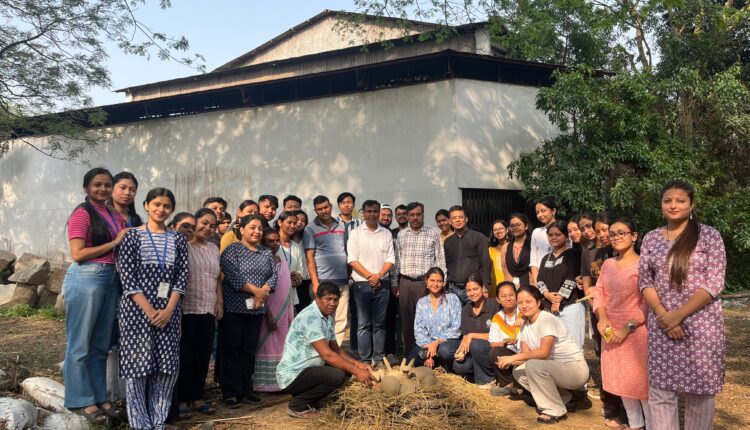A three-day skill development workshop on handmade pottery making was organised from 1st to 3rd April 2024 at Cotton University in collaboration with the Indian National Trust for Art and Cultural Heritage (INTACH), Assam and Kamrup chapters, as part of Skill India and
Viksit Bharat initiatives. This program was coordinated by INTACH”s Convener Professor Shiela Bora and Assistant Professor Dr. Manjil Hazarika. In the workshop, three traditional potters from Alipur Hirapara area of Baihata Chariali were invited to train the participants. The event was flagged off by Registrar of the University Dr. Arindam Garg.
The workshop was graced by the Vice Chancellor Prof. Ramesh Chandra Deka, Pro-Vice Chancellor Prof. Ganesh Chandra Wary, Dean of HSS Prof. Daisy Das, faculty members Prof. Rakhee Kalita Moral, Dr Hiren Deka, Dr. Narayan Sharma, Dr. Dimpy Mahanta, Dr. Purabi Deka Bose, Dr. N. Nirjanta Devi, Birupakshaya Giri Basumatary, and Jougathi Basumatary. The Director (in-charge) of the Directorate of Historical and Antiquarian Studies, Govt of Assam along with her colleagues also visited and encouraged the students during the workshop.
While addressing the participants, Dr. Arindam Garg and Prof. Shiela Bora explained the importance of learning about this art tradition that has been kept alive in different forms since the prehistoric past. The students were given a hands-on experience of the craft. They were also encouraged to carry forward this heritage of indigenous handcrafting skills and to think of innovative ways that would open up avenues for future employment.
During the first day of the practical session, translation pottery craftsmen Maakoni Hira, Dinesh Hira, and Dipen Hira taught the participants the art of mixing clay and sculpting it into different shapes and forms. The participants were also familiarised with the techniques of handmade pottery.
On the second day, the students involved themselves in carving different replicas and models of miniature terracotta figurines, art objects and seals belonging to the Harappan civilization, Neolithic period, Kushana period and archaeological terracotta objects from the Brahmaputra valley. They were also taught the art of painting on ceramics with natural pigments. On the last day, the workshop winded up with the training of delicately readying the sunbaked terracotta models and pots for firing. The workshop proved to be a fruitful endeavour geared toward the preservation of dwindling indigenous techniques which is certainly a pressing need of the hour. The organisers plan to organise an exhibition of the objects made during the workshop in the near future.

